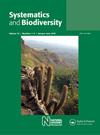牛毛centrum cepula(桔梗科,兰科)复合体的种划分:多学科方法
IF 2
3区 环境科学与生态学
Q2 BIODIVERSITY CONSERVATION
引用次数: 4
摘要
cepula毛centrum cepula复合体由caatingaense、T. cepula和T. sprucei三个物种组成,是南美洲安第斯山脉以东热带森林的特有物种。由于该复合体中广泛的形态变化,这些物种的划分有不同的解释。为了更好地了解这些生物单位,我们采用了一种综合方法,包括几何形态计量学、细胞遗传学分析(染色体计数和CMA/DAPI带)和分子系统遗传学(ITS和rpl32-trnL)。初步的形态计量学分析表明,云杉与其他两个类群有一定的重叠,是不同的。随后对唇瓣的分析,只包括在6个伪种群中组织的T. caatingaense和T. cepula,表明存在4个形态类群。所有标本均有2n = 36条染色体,CMA+/DAPI -端带和CMA - /DAPI+近中心点带,其数量在不同物种、地点甚至同一地点的个体中都有所不同。DAPI+近中心粒带的显著变化可能与转座因子有关,转座因子也可能是影响花广泛形态变化的一个因素。在系统发育分析中,T. caatingaense与T. cepula和T. sprucei是同属一支系,它们的亲缘关系倾向于由地理上的接近程度决定。我们得到的证据表明,以单一名称T. cepula处理该物种复杂的巴西种群提供了更多的分类稳定性和实用性,因此实施了必要的分类变化。本文章由计算机程序翻译,如有差异,请以英文原文为准。
Species delimitation in the Trichocentrum cepula (Oncidiinae, Orchidaceae) complex: a multidisciplinary approach
The Trichocentrum cepula complex comprises three species, T. caatingaense, T. cepula and T. sprucei, endemic to tropical forests east of the Andes in South America. The delimitation of these species has been diversely interpreted due to the extensive morphological variation in the complex. We applied an integrative approach to achieve a better understanding of these biological units, using geometric morphometrics, cytogenetic analysis (chromosome counts and CMA/DAPI banding) and molecular phylogenetics (ITS and rpl32-trnL). An initial morphometric analysis using the pre-identified specimens into three taxa suggested that T. sprucei is distinct from the other two, which show some overlap. A subsequent analysis of the labellum, including only T. caatingaense and T. cepula organized in six pseudo-populations, suggested the existence of four morphological groups. All analysed specimens presented 2n = 36 chromosomes, CMA+/DAPI− terminal bands and CMA−/DAPI+ pericentromeric bands, which varied in number across species, localities or even individuals from the same locality. The notable variation in DAPI+ pericentromeric bands may be related to transposable elements that could also be a factor influencing the wide morphological variation in the flowers. In the phylogenetic analysis, the specimens belonging to T. caatingaense formed a strongly supported clade sister to the rest, whereas the specimens belonging to T. cepula and T. sprucei emerged together, with their relationships tending to be determined by geographic proximity. The evidence we generated suggests that treating the Brazilian populations of this species complex under a single name, T. cepula, provides more taxonomic stability and utility, thus the necessary taxonomic changes are implemented.
求助全文
通过发布文献求助,成功后即可免费获取论文全文。
去求助
来源期刊

Systematics and Biodiversity
环境科学-生物多样性保护
CiteScore
4.10
自引率
0.00%
发文量
46
审稿时长
>24 weeks
期刊介绍:
Systematics and Biodiversity is devoted to whole-organism biology. It is a quarterly, international, peer-reviewed, life science journal, without page charges, which is published by Taylor & Francis for The Natural History Museum, London. The criterion for publication is scientific merit. Systematics and Biodiversity documents the diversity of organisms in all natural phyla, through taxonomic papers that have a broad context (not single species descriptions), while also addressing topical issues relating to biological collections, and the principles of systematics. It particularly emphasises the importance and multi-disciplinary significance of systematics, with contributions which address the implications of other fields for systematics, or which advance our understanding of other fields through taxonomic knowledge, especially in relation to the nature, origins, and conservation of biodiversity, at all taxonomic levels.
The journal does not publish single species descriptions, monographs or applied research nor alpha species descriptions. Taxonomic manuscripts must include modern methods such as cladistics or phylogenetic analysis.
 求助内容:
求助内容: 应助结果提醒方式:
应助结果提醒方式:


